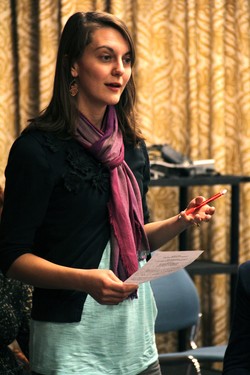 The Commission on the Status of Women enters its second week today. The Commission continues to meet and work on its task of making recommendations related to “the empowerment of women living in rural areas and their role in poverty and hunger eradication, development and current challenges” (Presbyterian revised version of the Commission’s theme). Presbyterians continue to attend side events and advocate with the Commission in partnership with our Ecumenical Women colleagues.
The Commission on the Status of Women enters its second week today. The Commission continues to meet and work on its task of making recommendations related to “the empowerment of women living in rural areas and their role in poverty and hunger eradication, development and current challenges” (Presbyterian revised version of the Commission’s theme). Presbyterians continue to attend side events and advocate with the Commission in partnership with our Ecumenical Women colleagues.
Some of the Presbyterian participants have already returned home and have begun to tell the story of their time at the Commission.
The Rev. Emily Miller returned to Jonesville, Michigan. Yesterday, she preached a sermon on Mark 8:27-38 at Jonesville First Presbyterian Church where she serves as pastor. In this passage, Jesus asks his disciples who people say that he is. Jesus goes on to tell them of his impending suffering, death, and resurrection. In Who Do You Say That I Am?, the Rev. Miller explored how this story intersects with and informs her experience at the Commission on the Status of Women. Some excerpts:
This past week I had the honor of participating in an event that everyone should know about, but very few do. “Every year, representatives of Member States gather at United Nations Headquarters in New York to evaluate progress on gender equality, identify challenges, set global standards and formulate concrete policies to promote gender equality and women’s empowerment worldwide.”Of the 193 member states of the United Nations, 45 states serve as members of the Commission on the Status of Women at any one time. …
The Commission on the Status of Women has been happening since 1946. For all of you who need a moment to think how long ago that was, it’s a few years. For fifty six commissions, something that began in a post world war two era, women and men from across the world have come together in NYC to stay up to date about what women are going through and what women need all over the world. At one point we were also asked “Should we be here?” After which a wise friend said, “No, we shouldn’t, if the world and society were as it ought to be, there would be no need for this gathering.” But the fact is there is a need, and “By sharing human stories of poverty, violence, and human rights violations the religious community gives a human face to abstract policy and legislation.” …
In our scripture today from Mark, Peter is asked to not tell people what he says that Jesus is, and therefore he is sent inward to ponder and reflect and question who it is that Jesus really is. Who is this person that I follow, of whom I am a disciple?! It would be so shocking if we said that didn’t know how that felt, but we do! So I want to ask a question, one that I hope sits with me and with you every single day. Jesus asked who do you say that I am? And I think we should always be asking the same thing to Jesus. That is where we find ourselves, with Jesus. But Jesus doesn’t let us stay there comfortably. Jesus didn’t undergo suffering so that we could be thankful for our own wellness. Jesus also didn’t die for us so that we could live only for ourselves. …
When women are not being treated with dignity and respect, are not being empowered to vote, or own land, or to be counted as a person, Jesus steps right in front of us and asks us what we are going to do about it. Being socially aware and doing social justice doesn’t mean sending money places to make yourself feel better every time you do so. In Matthew Jesus tells us not to sound a trumpet every time we give, bringing attention to ourselves, but to do it out of a sense of wanting. Social justice involves knowing the systemic issues that get in the way of other peoples’ empowerment and advancement. It means getting to the root of what is happening and why, and how to work with each community to make sure that it gets done in the way that respects them and empowers them. …
You’ll notice that Jesus never just hung out with his own followers – he called the crowds to come alongside of him as well. Then he spoke those familiar words: If any want to become my followers, let them deny themselves and take up their cross and follow me. Do as I do!
Thanks to the Rev. Milller for this sermon.
Watch for more information about the experience of Presbyterians at the Commission on the Status of Women.
The picture shows the Rev. Emily Miller reporting at the Presbyterian side event at the Commission on the Status of Women. Andrew Nam Chul Osborne took the picture.